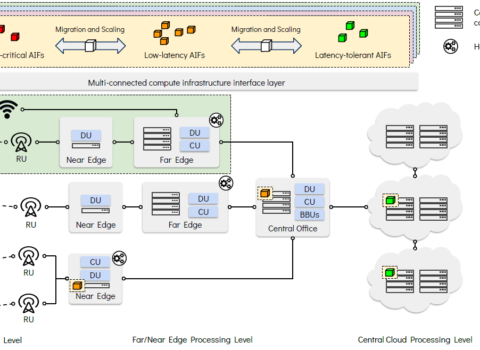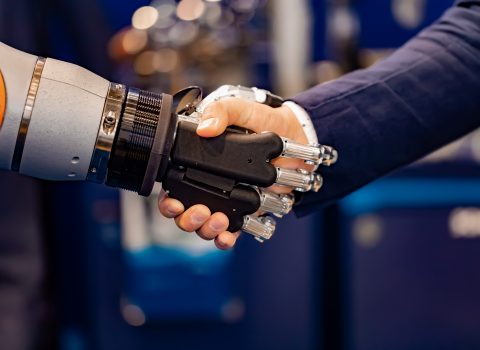
A brand new digital platform for fairs
TOFANE is a research project funded by the autonomous Province of Trento whose aim is the creation of a state-of-the-art platform for providing services for fairs based on localisation of visitors and assets. With the double goal of enriching the visitor experience of a given event and providing added value services for the exhibitors and the fair organization.
Fair organizations are undergoing a digital transformation process and manifesting strong interest for innovative solutions that can exploit the processing of data collected in exhibition venues. One kind of data for which a lot of interest has been expressed is the localisation of visitors and assets during the exhibition.
ThinkIN is a software platform that has been developed with the goal of collecting localization data for assets and people. The platform is agnostic to the technology used for detecting the position of the asset or person. ThinkIN is successfully deployed for several companies in various scenarios (Retail, Industry, Healthcare), it has also been used for some fair, and the early exposure to this new scenario made it clear its potential in terms of services that could be provided.
Through the evolution of traditional Edge Infrastructures, the goal of the TOFANE project is the creation of ThinkIN for Fairs platform. It should address both the visitors of a given event (navigation, personalized content delivery) and the fair organization (visitor flow analysis during the event, asset tracking in event setup and dismantling).
The project considers multiple aspects for providing fair organizers all the tools to satisfy the requests they get from visitors and exhibitors. For this reason three partners are involved:
- ThinkIN s.r.l. contributes with its experience in localisation data collection, processing and presentation
- Dimension s.r.l. has a strong knowledge in the mobile centered application starting from the required backends to the UX experience of the final application
- The Robust and Secure Distributed Computing (RiSING), a unit of the Cyber Security Research Center at FBK, investigates methods and design and implements platforms that guarantee efficiency, robustness and security in distributed computing environments covering the whole cloud-to-edge continuum.
One of the cardinal aspects is in the creation of an infrastructure that would allow the platform to be secure, scalable, resilient, easy to maintain and would allow some flexibility to provide some services closer to the consumer.
Such challenges have been mainly addressed through the evolution of the infrastructure typically used in fair venues: we started from the traditional one in which almost all operations must be carried out manually by maintainers; then we applied innovative automation concepts regarding the bootstrap, the provision and the configuration, allowing operators to manage it in an efficient and reliable way, hence saving operational costs; finally we applied strong security principles to cover privacy obligations and to avoid, as most as possible, unauthorized and malicious attacks to which an infrastructure of this type is certainly subject.
The goal of this article is to illustrate the enabled use-cases and describe, at a high level, the impact and the future plans of the project. For a more interested reader a complete article, describing the technical approaches to address the aforementioned challenges, can be downloaded from the sidebar of this page.
Enabled use-cases
The applicative use-cases that will be offered from the platform highlight the advantages of the combination between an automated infrastructure, cloud-native applications and an indoor/outdoor localisation system.
For example a first use-case is about “Low latency real time position”; in this use-case premium users looking to navigate to a specific stand may be connected via WiFi instead of mobile networks (eg: 3G/4G, LTE) reducing the latency by receiving positions updates from the “nearest” edge server which is running locally the ThinkIN position service.
Another interesting use-case is the “Real Time position sharing” in which in order to meet, or to be coordinated, two or more individuals might want to mutually share their position or a slightly sophisticated privacy-oriented version in which the pavilion is always shown, while the detailed position is shown only when they are in the same environment.
Finally two additional innovative use-cases enabled by the platform are “Delimited zone violation” and “Crowd management”. The first is interesting if kids are left in a supervised play area and parents or caretakers might be notified if the kids leave the area, while the second may be useful if a guided group is visiting the venue: in this case the coordinator wants to be alerted when someone, kids or elders, gets far from the group.
What’s next
Despite the growing use of online tools to communicate, fair events and tradeshows still remain of enormous importance, especially for B2B marketing purposes. In line with the growing demand for digital transformation, the events industry is introducing high value-added services to visitors and exhibitors, in order for them to best collaborate during the limited time of an exhibition or trade show.
Location is considered a key driver for the personalisation of the visitors’ experience, as well as a powerful tool for exhibitors to engage with attendees. Being able to properly deliver location-based services is responding to a clear market demand, and is the key objective of the TOFANE project.
In line with ThinkIN and Dimension market positioning, the next steps will target the engineering of project results into a full fledged product that can enter the market with a clear proposition and take advantage of the distributed and secure infrastructure as a distinguishing element compared to other solutions approaching the market.


